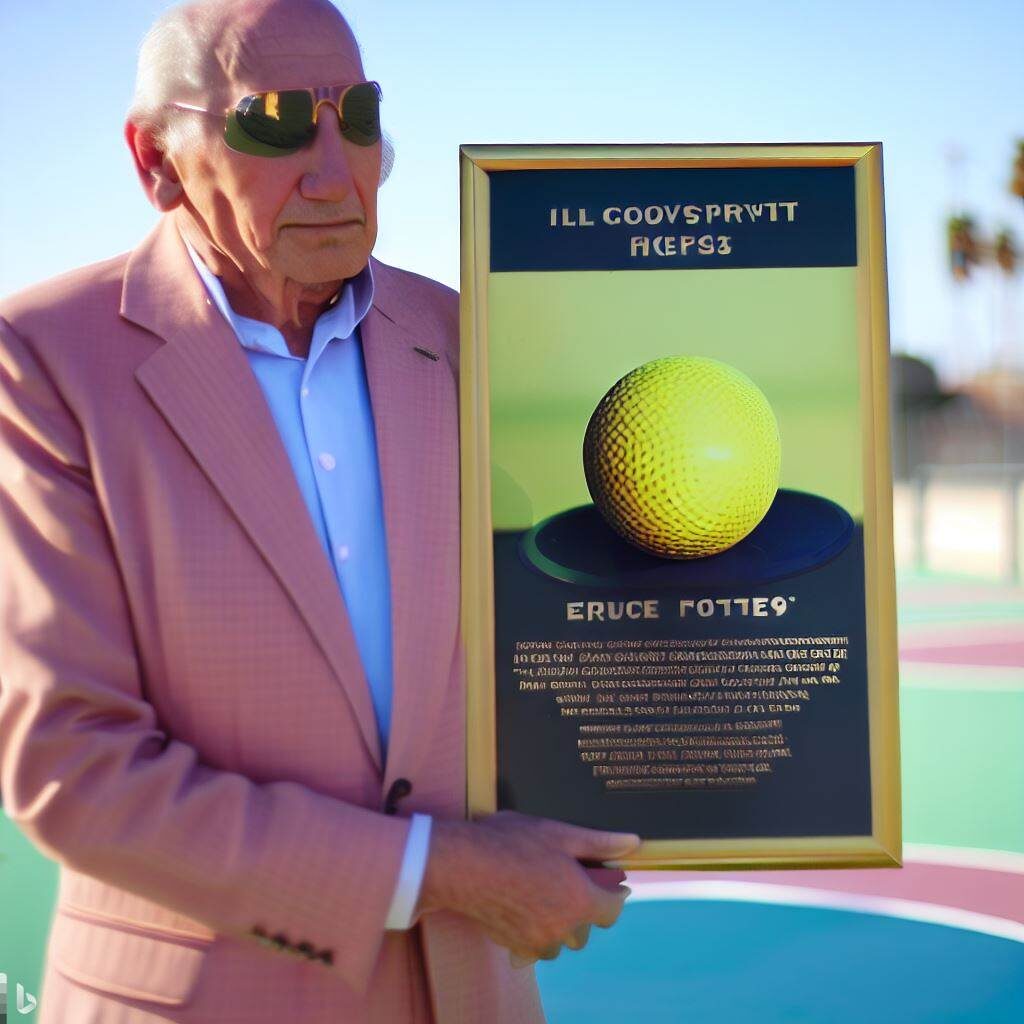Pickleball where did the name come from?

Unraveling the Origins: Pickleball, Where Did the Name Come From?
Who invented pickleball and why was it called pickleball? This is one of many questions we will answer for you. Pickleball, a sport that has taken the world by storm with its unique blend of athleticism and camaraderie, is often accompanied by a lingering question: where did the name “pickleball” come from? To unveil the mystery behind this peculiar name, we journey through time and tales to explore the origins and legends that have shaped the sport’s moniker.
Was pickleball named after a dog named Pickles? In the annals of pickleball history, one story reigns supreme – the tale of a family dog named Pickles. Legend has it that Pickles, a mischievous and spirited pup, was fond of chasing stray balls during the game’s formative years. His playful antics amused the players and became a part of the sport’s early folklore. As the game gained popularity and required a distinct identity, the memory of Pickles and his amusing ball-retrieval adventures inspired the whimsical name we know today as “pickleball.”
Beyond the playful influence of Pickles, linguistic and cultural connections have also played a role in shaping the name. Pickleball’s inventors, Joel Pritchard, Bill Bell, and Barney McCallum, sought a moniker that captured the essence of the game’s fusion of different sports. The term “pickleball” drew inspiration from other games, such as “pickle boat,” used in crew races to describe the boat left without a crew. This connection to competition and the idea of an element of chance and randomness made the name “pickleball” a fitting choice for a sport that blended various elements and strategies.
The unique combination of a mischievous dog’s influence and linguistic connections showcases the inventiveness and serendipity behind the name “pickleball.” It is a testament to the sport’s playful spirit and the creative ingenuity of its founders. The enduring charm of the name has undoubtedly contributed to the game’s widespread popularity, capturing the imagination of players worldwide.
The Birth of Pickleball: Tracing its Early Beginnings
Where did pickleball originate, way up in Seattle. The birth of Pickleball, a sport that spans generations and continents, can be traced back to a summer’s day in 1965 on Bainbridge Island, Washington. On that day, three fathers, Joel Pritchard, Bill Bell, and Barney McCallum, found themselves searching for a way to keep their families entertained during a weekend gathering. Little did they know that their quest for leisure would give birth to a phenomenon that would capture the hearts of millions.
Amidst the laughter and conversations, the three men stumbled upon an old badminton court that piqued their curiosity. They began to experiment, combining the rules of ping pong, tennis, and badminton to create a unique and accessible game that would cater to all ages and skill levels. With the use of wooden paddles and a perforated plastic ball, Pickleball was born.
The origins of the name “pickleball” itself hold a charming tale. As the story goes, the game’s moniker was inspired by the family dog, Pickles, whose active involvement in retrieving the balls amused all. The name stuck, becoming a testament to the whimsy and lightheartedness that defines the sport.
From its humble beginnings on Bainbridge Island, Pickleball quickly spread nationwide and eventually gained international recognition. Its accessibility and adaptability resonated with players of all backgrounds, fostering a sense of inclusivity and community. Today, pickleball courts can be found in schools, parks, and dedicated facilities worldwide, serving as a testament to the enduring legacy of the game’s inventors.
The Naming Enigma: Decoding the Unconventional Choice
| Section | Subsection | Description |
|---|---|---|
| 1 | Introduction | An overview of the naming enigma surrounding pickleball’s unconventional choice |
| 2 | Origins of the Name | Explore the various theories and anecdotes behind the naming of pickleball |
| 2.1 | The Pickle Container Myth | Debunking the myth that pickleball was named after a plastic pickle container |
| 2.2 | Pickles, the Family Dog | Unveiling the truth behind the playful involvement of a dog named Pickles in the name |
| 3 | Cultural Influences | Examine the cultural influences that played a role in shaping the naming of pickleball |
| 3.1 | Linguistic Connections | Analyze the linguistic connections and influences on the choice of the name |
| 3.2 | Fusion of Sports | Explore how the fusion of different sports contributed to the unconventional name |
| 4 | The Name’s Symbolism | Discuss the symbolic interpretations associated with the name “pickleball” |
| 4.1 | Playful Charm | Uncover the whimsical and lighthearted spirit captured by the name |
| 4.2 | Diversity and Collaboration | Explore the symbolic representation of diversity and collaboration in the name |
| 5 | Impact of the Unconventional Name | Investigate how the unconventional name has impacted pickleball’s popularity |
| 5.1 | Curiosity and Conversation | Discuss how the name generates intrigue and sparks conversations among enthusiasts |
| 5.2 | Unique Identity | Examine how the unconventional name distinguishes pickleball from other sports |
| 6 | Conclusion | Reflect on the enduring charm and significance of the unconventional name |
When it comes to the origins of the name “pickleball,” one cannot help but be intrigued by the unconventional choice that has become synonymous with the sport. The story behind the name involves a delightful interplay of playful symbolism, linguistic connections, and the inventive spirit of its founders.
Pickleball’s inventors, Joel Pritchard, Bill Bell, and Barney McCallum, sought a name that captured the essence of the game’s fusion of various sports. They drew inspiration from different sources for a distinctive and memorable moniker. One of these influences was the term “pickle boat,” commonly used in crew rowing to describe a boat with leftover or unassigned rowers. The connection to competition and the element of chance resonated with the inventors, leading them to choose the name “pickleball” to represent the game’s unpredictable and spirited nature.
Beyond its direct references, the name “pickleball” holds a delightful charm that invites interpretation. Some enthusiasts speculate that the word “pickle” in the name refers to the combination of diverse ingredients that Pickleball incorporates, similar to the mix of sports that inspired its creation. Others suggest that the term “pickle” may stem from the mispronunciation of the game’s original name, “pickleball,” by a family dog named Pickles, who became an unwitting muse for the sport’s name. Regardless of the exact origins, the name “pickleball” has an undeniable notion that has captured the imagination of players worldwide.
The unconventional choice of “pickleball” as a name reflects the inventiveness and spirit of the game itself. It sets the sport apart from its counterparts, sparking curiosity and generating conversations wherever it is mentioned. The playful symbolism within the name adds to the enjoyment and lightheartedness that players experience on the court, creating an atmosphere of fun and camaraderie.
Cultural Influences: The Fusion That Gave Birth to Pickleball’s Name

One must delve into the cultural influences that shaped its creation to understand the full depth and richness of Pickleball’s name. The sport’s inventors, Joel Pritchard, Bill Bell, and Barney McCallum, drew inspiration from a variety of sources, blending different elements to form a game that would captivate players across generations.
At its core, Pickleball combines the strategic elements of tennis, the fast-paced action of badminton, and the precise hand-eye coordination of ping pong. By fusing these sports, the inventors created a unique and accessible game that catered to a wide range of abilities. This blending of diverse athletic disciplines not only influenced the gameplay but also played a crucial role in naming the sport.
The name “pickleball” itself reflects this cultural fusion. The word “pickle” symbolizes the diverse ingredients that create something delightful. In Pickleball, players bring their skills and experiences, blending them harmoniously on the court to form a unified game. The inventors recognized this essence and sought a name that mirrored the spirit of collaboration and unity inherent in the sport.
The linguistic connections within Pickleball’s name further illustrate the cultural influences. “pickle boat,” derived from crew rowing, represents a vessel with leftover or unassigned rowers. This connection to the world of competitive sports brings elements of chance and unpredictability to Pickleball’s name, reflecting the thrilling and dynamic nature of the game itself.
The following sections will delve deeper into the stories, myths, and reality surrounding Pickleball’s name. Join us as we unravel the intricate web of influences, exploring the cultural tapestry that has shaped this beloved sport. From its diverse sporting origins to the creative ingenuity of its inventors, Pickleball’s name stands as a testament to the power of cultural fusion and the enduring legacy of a game that continues to capture the hearts of players worldwide.
The Inventors’ Legacy: Insight into the Minds Behind Pickleball

To fully appreciate the naming and creation of Pickleball, it is essential to delve into the legacy of its inventors. Joel Pritchard, Bill Bell, and Barney McCallum, three fathers seeking entertainment for their families, inadvertently birthed a sport that would transcend their initial intentions. Understanding their motivations and contributions sheds light on the enduring impact of their innovative spirit.
Joel Pritchard, a congressman and Lieutenant Governor of Washington State, brought his passion for sports and creativity to the table. His desire to create a game that could be expected by people of all ages and skill levels was the driving force behind Pickleball’s inception. Pritchard’s vision of inclusivity and accessibility laid the foundation for the game’s enduring appeal.
A successful businessman, Bill Bell brought his entrepreneurial insight and problem-solving skills to the project. With his engineering background, Bell played a pivotal role in refining the equipment and rules of Pickleball, ensuring that the game struck the perfect balance between challenge and enjoyment. His contributions helped shape the game into a harmonious blend of athleticism and fun today.
Barney McCallum, a renowned table tennis player, and inventor, brought his expertise in sports and a playful spirit to the mix. McCallum’s experience in ping pong infused Pickleball with the precise hand-eye coordination and strategic gameplay that sets it apart. His passion for innovation and ability to adapt different sporting elements were instrumental in creating a game that captured the imagination of players worldwide.
The inventors’ collaborative efforts and shared love for sports resulted in a game that embodied their collective vision and spirit. Their legacy extends far beyond the mere creation of Pickleball; it encompasses the principles of inclusivity, creativity, and joy that have become synonymous with the sport.
Myth vs. Reality: Unraveling the Stories Behind Pickleball’s Name
| Myth | Reality |
|---|---|
| The name “pickleball” originated from the | The name “pickleball” actually came from a family dog named |
| inventors’ fondness for pickles. | Pickles, who was known for chasing stray balls during the game. |
|---|---|
| “Pickleball” was a mispronunciation of | The term “pickleball” was in use before Pickles entered the picture. |
| “pickleball” by a family dog named Pickles. | However, the mispronunciation theory adds to the playful nature |
| of the sport’s name. | |
|---|---|
| The game was named after using a plastic | The name “pickleball” was chosen before the use of pickle |
| pickle container as a net during gameplay. | containers in the game. |
| The name predates such associations, stemming from the influence |
| of the family dog and the game’s playful spirit. | |
|---|---|
| The name “pickleball” has no particular | The name “pickleball” was chosen to represent the sport’s |
| significance or symbolism. | unpredictable and spirited nature, as well as its unique blend of |
| diverse elements from various sports. | |
|---|---|
| The name was inspired by the combination | While the game’s fusion of different sports influenced the name, |
| of different sports into one game. | the specific reference to “pickle boat” in rowing was one of |
As Pickleball’s popularity continues to soar, so does the curiosity surrounding the stories and myths surrounding its name. From mischievous dogs to playful mispronunciations, the tales behind the origin of the phrase “pickleball” have taken on a life of their own. This section will explore the myths and reality surrounding these anecdotes, separating fact from fiction.
One popular myth suggests that the name “pickleball” originated from the inventors’ fondness for pickles themselves. It is believed that the game was initially played using a plastic pickle container as a makeshift net, lending its name to the sport. While this story adds a charming twist to the pickleball narrative, the truth is that the name predates the use of pickle containers in gameplay. The name’s origin lies in the family dog named Pickles, whose playful involvement became a memorable part of the sport’s early days.
Another myth suggests that “pickleball” was a mispronunciation of the game’s original name, “pickleball.” According to this tale, a family dog named Pickles would chase after the balls during the early matches, leading to the playful mispronunciation that stuck. While this anecdote adds a whimsical touch to the name’s story, it is worth noting that the term “pickleball” was already in use before Pickles entered the picture. However, the mispronunciation theory further enhances the lighthearted nature of the sport and the playful spirit associated with its name.
Separating fact from fiction is challenging regarding the history and legends surrounding Pickleball’s name. While the true origin lies in the inventors’ tribute to their beloved family dog, Pickles, the myths and misinterpretations that have emerged over the years only enhance the allure and intrigue of this unique sport. Regardless of the specifics, one thing is sure: Pickleball’s name has become a beloved symbol of fun, unity, and the joyous spirit that defines the game.
Pickleball’s Rise to Popularity: A Global Phenomenon

When did pickleball become popular? The answer will shock you, 1976. From its humble beginnings on Bainbridge Island, Pickleball has transcended its origins to become a global sensation. The sport’s unique name, playful nature, and inclusive appeal have contributed to its remarkable popularity. In this section, we will explore the evolution of Pickleball from a backyard pastime to a beloved sport embraced by players worldwide.
As Pickleball gained recognition in the 1970s, its infectious spirit, and accessibility attracted players of all ages and skill levels. The game’s simple rules and smaller court size made it approachable for beginners, while it’s fast-paced action and strategic elements provided a challenge for more seasoned athletes. Pickleball’s ability to cater to diverse demographics and its emphasis on camaraderie and friendly competition contributed to its rapid growth and widespread adoption.
The global recognition of Pickleball can be attributed to its enthusiastic community of players and the power of social connections. As players introduced the sport to their friends, families, and communities, the word spread rapidly, leading to the establishment of dedicated pickleball courts, clubs, and tournaments around the world. Social media platforms and online communities further accelerated Pickleball’s visibility, enabling players to share their experiences, connect with fellow enthusiasts, and organize events internationally.
Today, Pickleball has transcended borders and cultures, captivating players in countries far and wide. Its unique name, symbolizing the sport’s playful spirit and distinct identity, has become synonymous with a vibrant and welcoming community. Pickleball enthusiasts are united by their shared love for the game, regardless of their language, background, or geographical location. This sense of belonging and connection has propelled Pickleball to become a global phenomenon.
The Name’s Enduring Charm: Pickleball’s Significance and Symbolism
| Aspect | Explanation |
|---|---|
| Whimsical Spirit | The name “pickleball” captures the whimsical and lighthearted nature of the sport, evoking joy and spontaneity. |
| Inclusivity | Pickleball’s name symbolizes inclusivity, as the sport welcomes players of all ages, backgrounds, and skill levels. |
| Playful Symbolism | The word “pickle” within the name represents the blending of diverse ingredients, mirroring the fusion of skills and strategies in the game. |
| Community-Building | The name fosters a sense of community and social connections, bringing people together through shared experiences on and off the court. |
| Curiosity and Conversation | The name “pickleball” sparks curiosity and invites conversations, leading to increased awareness and interest in the sport. |
| Identity and Recognition | The enduring charm of the name has contributed to pickleball’s recognition as a distinct and beloved sport, with its own unique identity. |
| Joy and Fun | The name embodies the essence of joy and fun that players experience while playing pickleball, creating a positive and vibrant atmosphere. |
| Uniqueness | The unconventional choice of the name sets pickleball apart from other sports, making it instantly recognizable and memorable. |
| Versatility | The name encompasses the adaptability and versatility of the sport, which can be played indoors or outdoors on various court surfaces. |
| Shared Experience | The name serves as a reminder of the shared experiences, memories, and friendships formed through the game, creating lasting connections. |
The name “pickleball” holds a lasting charm that resonates with players and enthusiasts alike. Beyond its playful origins, the name carries a more profound significance and symbolism that has contributed to the sport’s enduring appeal. This section will explore the multifaceted layers of meaning within Pickleball’s name and its impact on the sport’s culture.
At its core, the name “pickleball” represents the whimsical and lighthearted spirit of the game. It evokes a sense of joy, spontaneity, and adventure players experience on the court. The unconventional choice of a name captures the essence of Pickleball’s unique blend of athleticism and fun, setting it apart from traditional sports and fostering an environment of inclusivity and camaraderie.
The word “pickle” within the name holds symbolic interpretations that resonate with the pickleball community. As pickling involves preserving and transforming ingredients, Pickleball brings together diverse players with varied skills, backgrounds, and experiences. The game acts as a catalyst, blending these elements to create a harmonious, unified whole. The name serves as a reminder that in Pickleball, like in life, embracing diversity and collaboration leads to a more vibrant and enjoyable experience.
Moreover, the enduring charm of Pickleball’s name lies in its ability to evoke curiosity and spark conversations. People who hear “pickleball” are often intrigued and eager to learn more about the sport. This inherent intrigue contributes to the sport’s continuous growth and expanding community. It invites newcomers to explore the world of Pickleball, fostering a sense of wonder and discovery as they embark on their pickleball journey.
In the upcoming sections, we will further explore the cultural significance of Pickleball’s name and its impact on communities. Join us as we uncover the stories, traditions, and values that have emerged around the sport and celebrate the enduring charm that the name “pickleball” brings to players around the world.
Cultural Significance: Pickleball’s Impact on Communities and Social Connections
Beyond its name and gameplay, Pickleball holds a significant cultural influence that extends far beyond the boundaries of the court. The sport has become a catalyst for building communities, fostering social connections, and creating lasting bonds among players of all ages and backgrounds. In this section, we will explore the cultural significance of Pickleball and its transformative impact on individuals and communities.
Pickleball is a unifying force, bringing people together in a shared pursuit of fun, competition, and friendship. The sport transcends cultural and generational barriers, offering a common ground where people from diverse backgrounds can unite and forge connections. Whether it’s on local courts, at tournaments, or in online communities, pickleball enthusiasts find a sense of belonging and camaraderie that goes beyond the game itself.
Communities that embrace Pickleball often experience a multitude of benefits. The sport fosters an active and healthy lifestyle, promoting physical fitness, coordination, and mental well-being. It provides an avenue for people to exercise regularly, helping combat sedentary habits and promote overall health. Beyond the physical benefits, Pickleball encourages social interaction and combats social isolation, particularly among older adults who find companionship and a sense of purpose through the sport.
Furthermore, Pickleball has the power to strengthen community bonds and bring people closer together. Local tournaments, leagues, and social events centered around Pickleball provide opportunities for neighbors, friends, and families to come together and share in the joy of the game. The sport acts as a social glue, creating connections and fostering a sense of community pride and identity.
Conclusion: Reflecting on Pickleball’s Enduring Legacy
The answer to, Pickleball where did the name come from. Is coming more into focus. As we come to the end of our exploration into the origins and cultural significance of Pickleball’s name, we are left with a profound appreciation for the enduring legacy of this beloved sport. From its humble beginnings on Bainbridge Island to its global recognition and community-building impact, Pickleball has captivated the hearts of players and enthusiasts worldwide.
Pickleball’s name, with its whimsical origins and playful symbolism, embodies the spirit of the game itself. It represents inclusivity, collaboration, and the joy of shared experiences. The inventors, Joel Pritchard, Bill Bell, and Barney McCallum, infused their vision into every aspect of the sport, from its name to its rules, creating a game that transcends generations and cultural boundaries.
The global rise of Pickleball can be attributed to the passion and dedication of its players, who have embraced the sport’s values and spread its joy to communities far and wide. The name “pickleball” has become a symbol of unity, fostering connections and friendships that extend beyond the boundaries of the court. Through tournaments, social events, and online communities, pickleball enthusiasts have built a vibrant and welcoming network, forming bonds that endure both on and off the court.
As we reflect on the journey of Pickleball’s name, we celebrate the transformative power of sport and its ability to bring people together. Pickleball has become more than just a game; it is a testament to the human spirit, resilience, and the pursuit of joy. Its legacy will continue to inspire future generations, reminding us that through shared experiences, we can forge connections, build communities, and create a world enriched by the power of play.
In closing, we invite you to pick up a paddle, join a game, and experience the magic of Pickleball for yourself. Let the spirit of unity, fun, and inclusivity guide you as you embark on your pickleball journey. May the name “pickleball” forever evoke a sense of excitement, curiosity, and the enduring legacy of a sport that has captured the imagination and hearts of millions worldwide.
Frequently Asked Questions
Why is pickleball so popular?

Pickleball’s popularity stems from its unique blend of accessibility, fast-paced gameplay, and social camaraderie, making it appealing to people of all ages and skill levels.
Why do they call pickleball pickleball?

Pickleball is called “pickleball” because it was named after the family dog, Pickles, who would chase after the balls during the game’s early days, inspiring the inventors to adopt the playful and memorable name.
Was the game of pickleball named after a dog named pickles?

Yes, the game of pickleball was indeed named after a dog named Pickles, who became an unwitting inspiration and playful companion during the early days of the sport’s development.
Where did pickleball come from?
Pickleball originated on Bainbridge Island, Washington in 1965 when three fathers—Joel Pritchard, Bill Bell, and Barney McCallum—created the sport as a family-friendly game, blending elements from tennis, badminton, and ping pong.
What 3 sports was pickleball invented from?
Pickleball was invented by combining elements from badminton, tennis, and ping pong, resulting in a sport that incorporates the strategic gameplay of tennis, the quick reflexes of ping pong, and the fun and accessibility of badminton.
Pickleball where did the name come from?
The name “pickleball” originated from the family dog named Pickles, who would chase after the balls during the early days of the game, ultimately inspiring the playful and whimsical name.
What are some cultural influences that shaped the creation of pickleball’s name?
Pickleball’s name drew inspiration from the term “pickle boat” in crew rowing and symbolizes the blend of diverse ingredients and the element of chance in the game.
Why is pickleball so popular?
Pickleball’s popularity stems from its unique blend of accessibility, fast-paced gameplay, and social camaraderie, making it appealing to people of all ages and skill levels.
What is the significance of pickleball’s name?
The name “pickleball” holds enduring charm as it represents the sport’s whimsical spirit, inclusivity, playful symbolism, and its ability to spark curiosity, conversations, and community-building.
